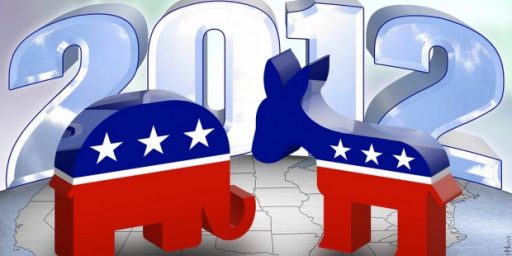Institutions 101 and the Sequester
Institutional dynamics in the US constitutional system are the key to undertstanding our current predicament.
We are, of course, in the midst of the High Blame Game at the moment, as different parties, factions, and individual politicians attempt to position themselves for blame and/or credit for the results of the sequester (one need only turn on the television surf on over to Memeorandum to see what I am talking about).
Let’s cut to the chase, however, and focus on a simple fact regardless of its whatever partisan significance one thinks it has: in our system, one of symmetrical bicameralism with separation of powers, any legislative solution to any problem (which, in domestic politics especially means pretty much all of them) requires the acquiescence of multiple actors and can be derailed at multiple points. Further, the main levers of legislative power reside, as the name would suggest, in the legislature.
During the last week I heard any number of calls for presidential “leadership” as if the solution to our policy impasse is just some magical words.* As Richard Neustadt noted many years ago, “presidential power is the power to persuade,” and in that sense there is a focus on the leadership variable. However, while Neustadt was right about the fact that the president cannot command, and therefore has to bargain, being the institutionalist that I am, I would argue against the word “power” in this context. The veto is a “power” (and an important one) that that president can use when transacting with Congress. Persuasion, however, is just a tool, and one of which too much can be made. It matters not how persuasive a given president is (or how much “leadership” said president displays), if the political opponent is unpersuadable, then impasse continues.
Indeed, if we look at the institutional parameters under which the US federal government operates, we find, quite clearly, that the power to change the direction of the sequester lies firmly in the hands of the legislature. That power is divided into two chambers that have to agree on identical solutions (i.e., we have symmetrical bicameralism). Each of those chambers are further divided. First they are divided by party. In the House of Representatives this typically means a majority fully in control of the chamber’s agenda. However, in recent years that majority has been factionalized and Speaker Boehner has not been fully in control. The need to placate the Tea Party faction has meant that it is very difficult to gain a working consensus within the House (since the majority has to negotiate with itself).** In the Senate the cloture rule means that almost any decision made by the Senate requires a supermajority of 60 votes. Since it is an incredibly rare thing for the majority party in the Senate to have 60 votes, this means that the minority has a great deal of power over the legislative process.
So, let’s recap.
First, the basic configuration of the constitutional order makes legislating difficult, and it puts the primary onus on the legislature, since the legislature and only legislature can formally initiate legislation. The president can suggest, the president can ask, the president can hold press conferences, etc. However, despite the way of lot folks want to make it sound: we decidedly do not have a parliamentary system in which the executive is the main initiator of the legislative agenda. Indeed, quite the opposite—instead of initiating the only actual constitutional power that the president has is the veto (which can only be deployed at the end of the process and the threat of which is only useful as a negotiating tool once an actual legislative proposal is being considered).
Second, that complex system has been made even more difficult to navigate of late. The lack of unity in the House majority is one such variable, and a relatively new one. The empowerment of the minority in the Senate, while not new, has become increasingly more significant in the last decade or so.
All of this has to be taken into account to assess outcomes.
Ultimately, there is a case to be made, at varying levels of significance, about all the actors involved, as they all share responsibility for the current predicament. However, the fact that there are varying levels is important. This is not a case in which all measures of blame are equal, because not all power over the process is equal. Further, I think it is important that we truly understand how this game is played, rather than simply assuming that a) our team is not the problem, or b) that it all lays at the feet of the most prominent player. I say this not as as a defense of the President, but rather as someone who profoundly thinks that solutions to problems cannot not be created until an accurate diagnosis is made. Our system makes coming to decisions very, very difficult and we need to face up to that fact. It is also a system in which directly assigning responsibility is difficult (and hence the current political dance I noted at the start of this post. It makes democratic accountability maddeningly difficult).
*Indeed, I have thought on numerous occasions of late about Matthew Yglesias’ “Green Lantern Theory of Geopolitics” which was a reference to the fact that Green Lantern’s power ring was only limited by his power of will. More will power, more effective use of the ring. As such, I keep hearing a lot of commentator’s seemingly assert that if only the president asserted more will over the process that he would get results. Of course, that’s not how it works. For more on Green Lanternism (and it application to the presidency, see Brendan Nyhan’s 2009 post: The Green Lantern theory of the presidency.
**Recall: the main reason we ended up with the Fiscal Cliff and then the Sequester of Doom was because it was impossible for any other solution, save for no raising the debt ceiling and living with those consequences, to pass the House. The entire process was driven, ultimately, by the factional fights in the House.





There are a lot of folks both on the left and on the right, who believe that Obama has Green Latern/Jedi Knight type powers to force the Congress to do things they don’t want to do. Obama has just now tried to disabuse people of that, but I’m not sure he’ll succeed. People seem to want to believe that the President has super powers.
It means, I guess, that they don’t have do stuff. It’s easier to blame the President for not exercising his super powers than to work your behind off to pressure Congress into doing what the President wants, for instance.
@stonetools:
Not to mention coming to grips with the fact that most congressional races are non-competitive, and so most members of congress don’t really have to care what we think. Easier to just hope for superpowered presidents than to deal with the implications of this situation.
Booman has it right http://www.boomantribune.com/story/2013/2/25/223210/196 In 2010 we elected a bunch of
And now Obama, Boehner, and McConnell are all sitting on their hands, helpless, until
The thing I’ve noticed again this week is that as long as the Republicans act as the crazy party, the Democrats need only and can only act a little bit saner.
They “can only” because when the Republicans say no tax increases are needed, and un-named and fictional cuts are all that is needed, anything more “real” sounds draconian.
“Obama really wants to raise all your taxes!”
(Magic is much better.)
Oh, one for OTB specifically … when every “first” tax increase on the rich is “class warfare,” the implied counter-factual is that no tax increase is needed at all.
That because unless you specifically call for middle income tax increases yourself, you are playing the game.
Apparently this sentence got so tired struggling through all those unecessary qualifiers that it died before making it to the verb clause.
@Stormy Dragon: I have no idea what you are talking about. As I look at it now, it have a verb clause. 😉
(and yes, a tortured sentence in many ways–the burdensome nature of the qualifiers, however, and all that they entail stylistically, do attempt to make a point).
@Steven L. Taylor:
I think Stormy’s right that it kinds of runs out …
“Let’s cut to the chase, however. Focus on a simple fact regardless of its whatever partisan significance one thinks it has. In our system, one of symmetrical bicameralism with separation of powers, any legislative solution to any problem.”
@john personna: He was right. I was just being a smart-alec (and a bit glib) insofar as in response to his correct assessment I went back and fixed it. Hence, it was corrected by the time I posted the comment.
@Steven L. Taylor:
Never mind …
@john personna: It’s my own fault at a too-subtle (and not to mention a bit lame) attempt at humor.
@Steven L. Taylor: ” Easier to just hope for superpowered presidents than to deal with the implications of this situation. – See more at: https://www.outsidethebeltway.com/institutions-101-and-the-sequester/#sthash.SgHiijXV.dpuf”
Either you or another blogger referred to the ‘Democratic safety net’, meaning the assumption that the GOP can f*ck up all that it wants, but that the Democrats will save the day by being responsible. And that this was not always going to happen.
@Barry:
I don’t recall deploying that phrase. I know I never intended the meaning you suggest.
@Barry:
“Either you or another blogger referred to the ‘Democratic safety net’, meaning the assumption that the GOP can f*ck up all that it wants, but that the Democrats will save the day by being responsible. And that this was not always going to happen.” – See more at: https://www.outsidethebeltway.com/institutions-101-and-the-sequester//#comments
As relates to my comment above about the crazy party, and their reliance on the saner party … it is a lot like co-dependence. Very commonly the right will be crazy, and then demand that the Democrats fix things for them.
e.g. – “we Republicans can’t name cuts, Obama should name cuts”
(The imprecise “see more at” is kind of silly. It came in with some web engine upgrade, I take it?)
@john personna: It would appear that one of the plugins we used has added that “feature” without asking sometime this week,
I noticed it myself only yesterday and only figured out the likely culprit within the hour (James was caught unawares as well).
I expect we will work to correct it, as I find it annoying (as does James, methinks)–and you rightly note it makes no sense in the context of a comment thread.
I think we just have to face the fact that we wont have any serious attempt at governance till the Democrats get back 60 seats in the Senate and a majority in the House. Both the Democrats and the MSM hate that – the Democrats because they are anxious to get important stuff done like climate change and the MSM because they’re committed tithe idea of ” bipartisan Government” working.
The plain fact is that the only kind of government that can work in these partisan times is one where either party has supermajorities in both houses. Media blithering about ” bipartisan compromise” or ” the power of the bully pulpit” is really just nostalgia for a different time or a time that never was.
I blame both parties. The Republicans are the insane and dumb party, the Democrats, as usual, the coward parties. Both of them are full of platitudes, but no long term solution.
http://articles.washingtonpost.com/2013-02-27/opinions/37319431_1_tax-cuts-brain-military-officers
A long term solution would require something like the 1991 or the 1993 budgets, and that would be tough. By the way, the sad truth is that most of the people that supported the last two successful anti-deficit legislation paid that with their political careers.
@Andre Kenji: “the Democrats, as usual, the coward parties. ”
Which you don’t support. 1991 was with a far different GOP. 1993 was a budget passed with zero GOP support (Gore cast the tie-breaker). BTW, both were bitterly denounced by all right-wingers as setting us up for disaster.